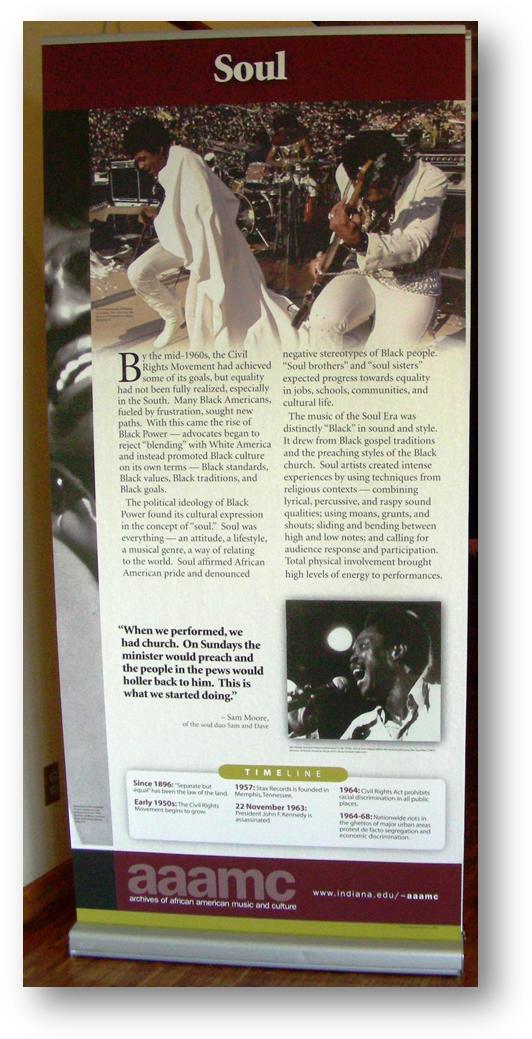Programming
The Archives of African American Music and Culture is constantly working to develop a variety of public programs that utilize collection resources and invite exploration of topics relevant to African American expressive culture. Frequently co-sponsored by other institutions or campus units, these educational and cultural programs include concerts, exhibitions, lectures, workshops, and symposia on various African-American musical genres. A representative sampling is listed below.Celebrating HBCU Music Traditions
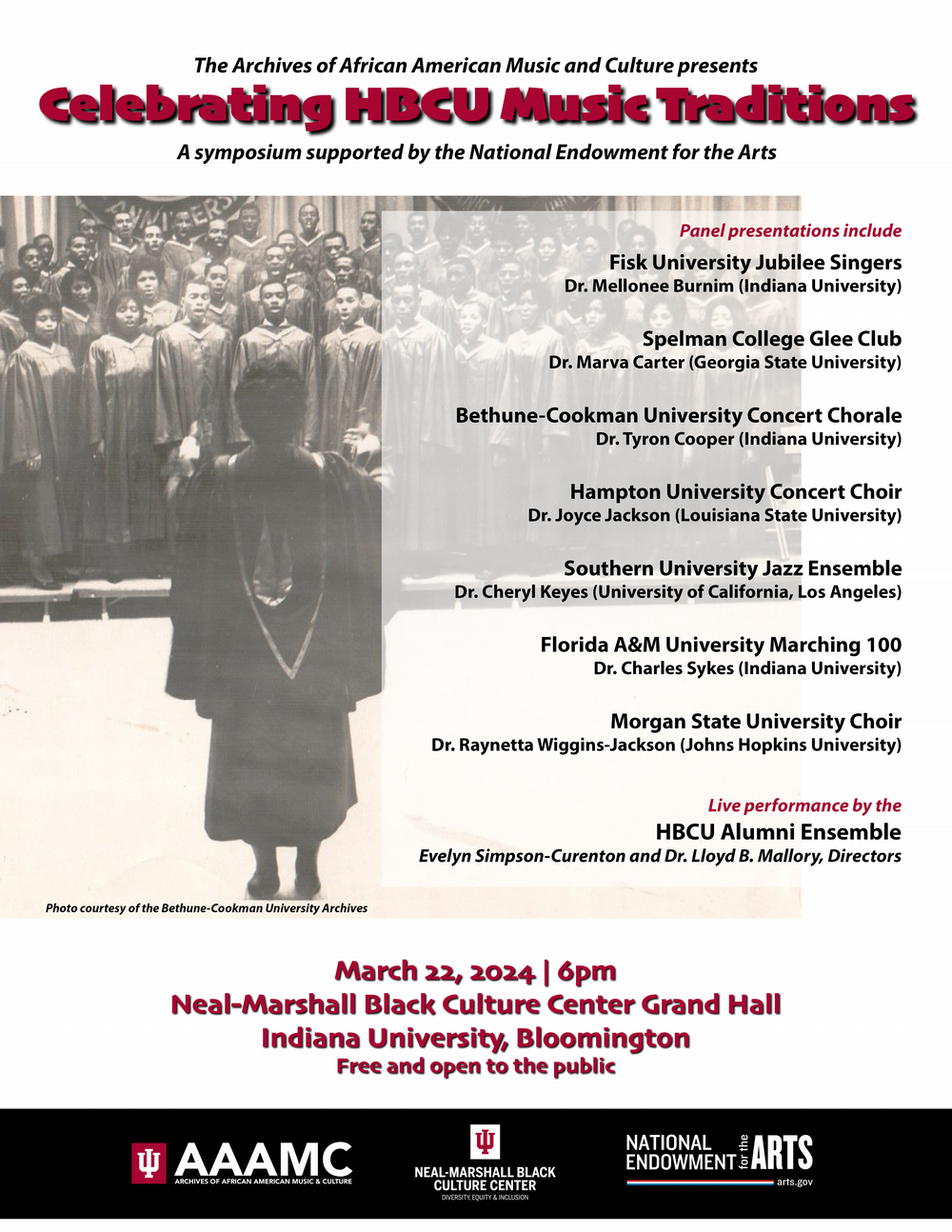
AAAMC invites you to join us on March 22nd at 6PM for Celebrating HBCU Music Traditions, a symposium honoring the foundational and innovative musical heritages at historically Black colleges and universities.
The symposium, supported by the National Endowment for the Arts and co-sponsored by the Neal-Marshall Black Culture Center, will feature several prolific scholars presenting research documenting the historical legacy of the distinguished choirs, marching bands, and jazz ensembles that forged strong, positive images of HBCUs, contributed to the sustainability of their institutions, and uniquely impacted student success.
Following the model originally established by the Fisk Jubilee Singers in the aftermath of the Civil War, these traditions remain a strong presence at HBCUs in the twenty-first century and continue to serve a vital role in shaping and defining African American identity both at home and abroad.
This collaborative event will include a special performance by the HBCU Alumni Ensemble, created for this occasion, who will sound the richness of these traditions.
View the event program here for more information.
The Black Church Mixtape: A Virtual Listening Party
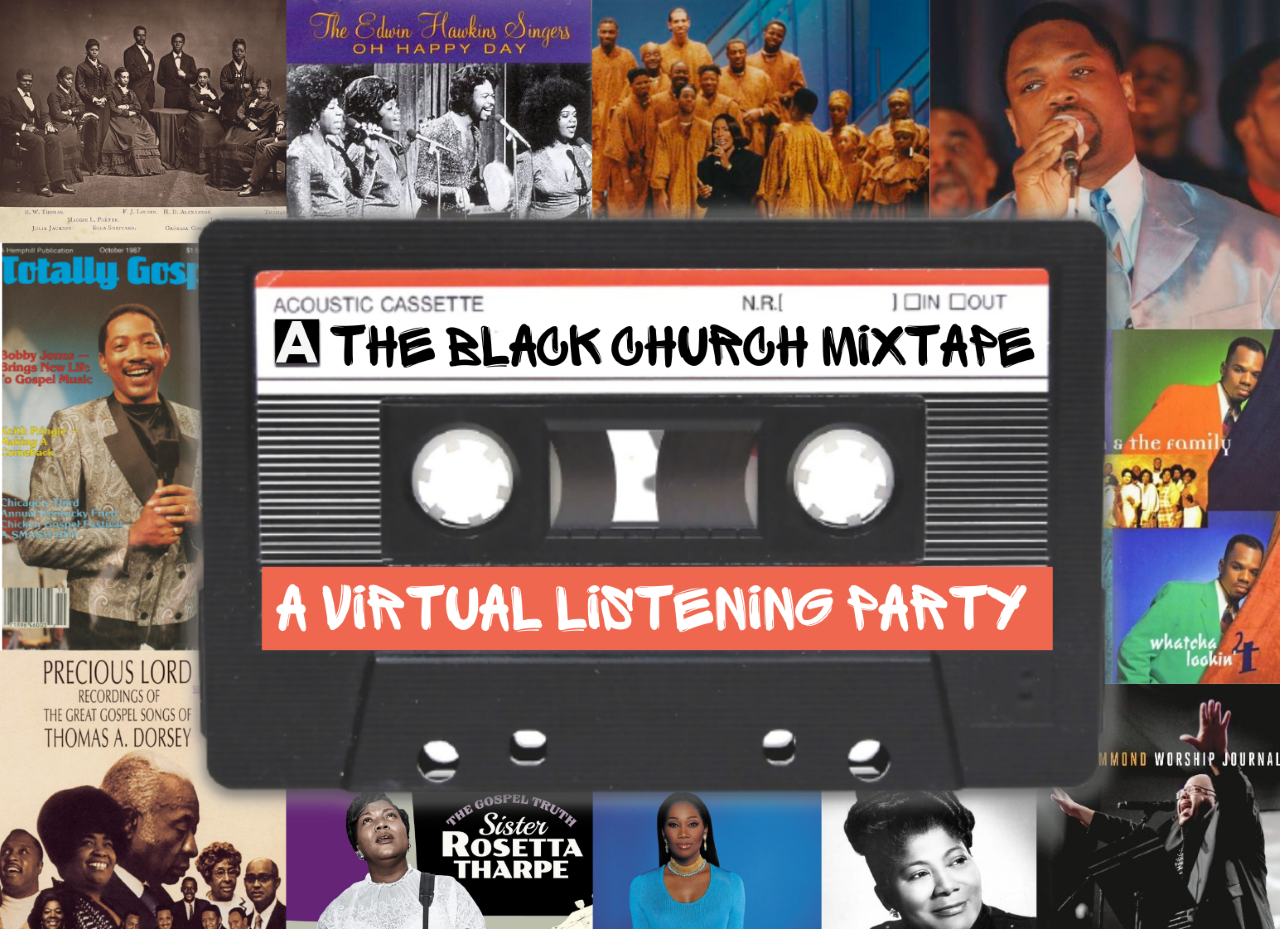
Black Music Honors
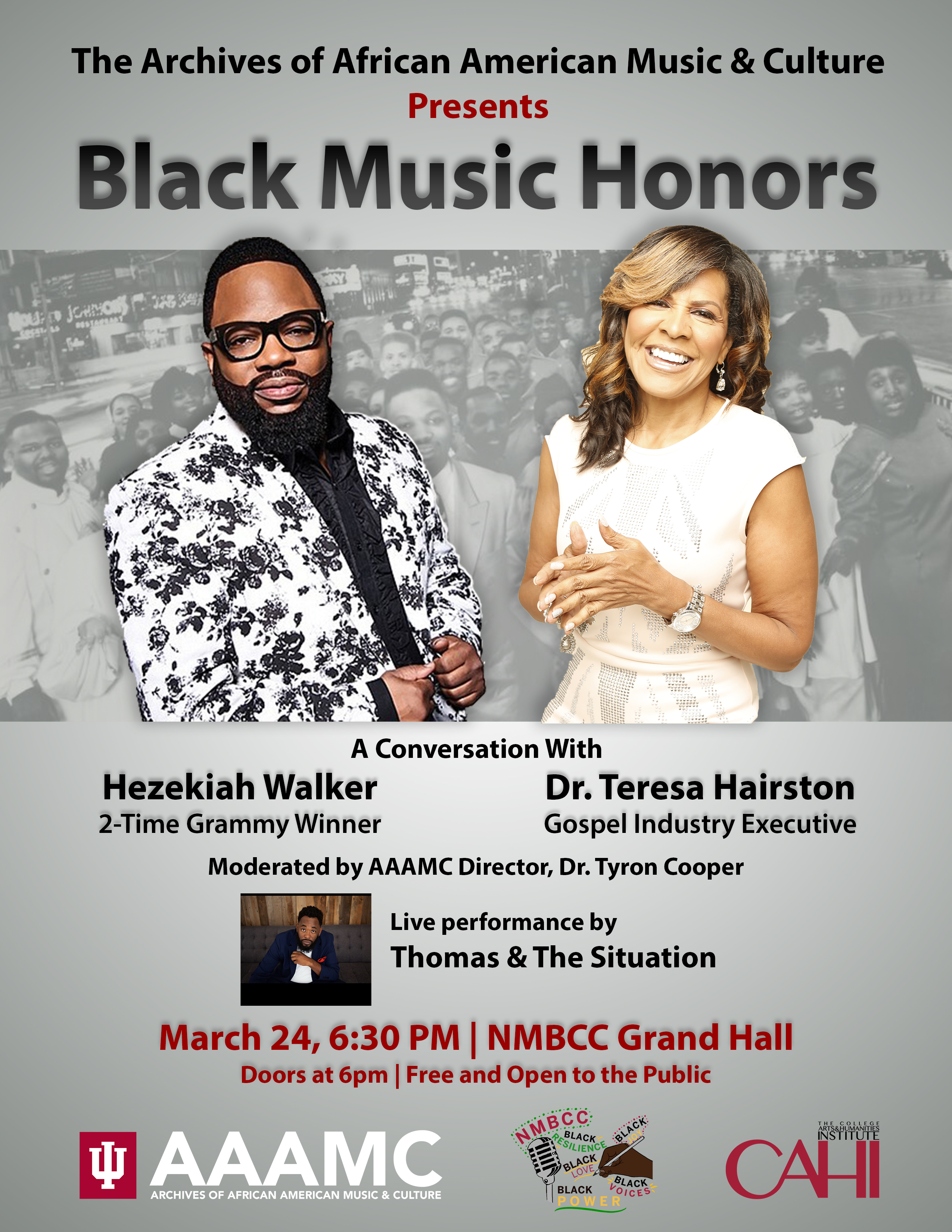
Crooked Stick: Songs in a Strange Land
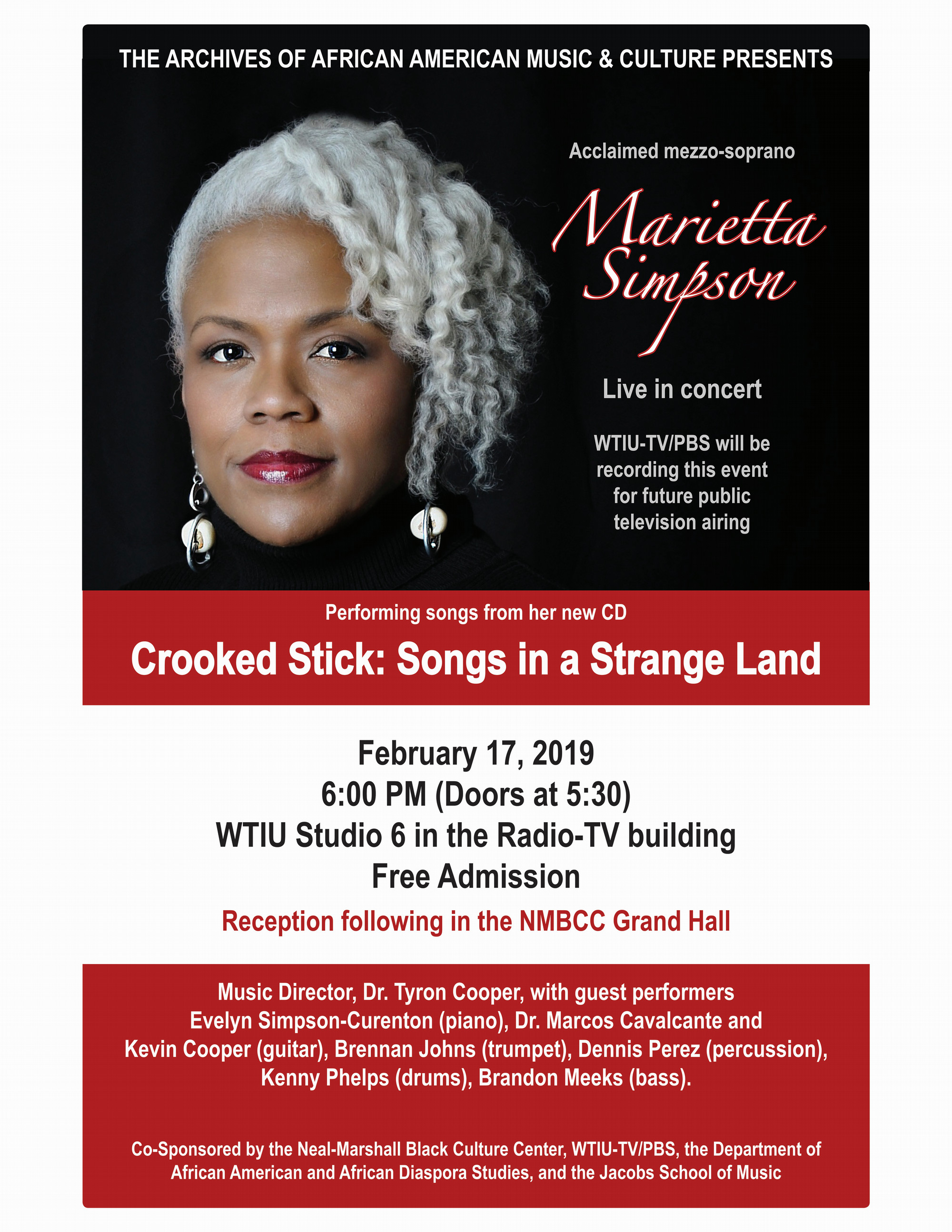
Funkology: A Conversation with Bootsy Collins and Dr. Scot Brown
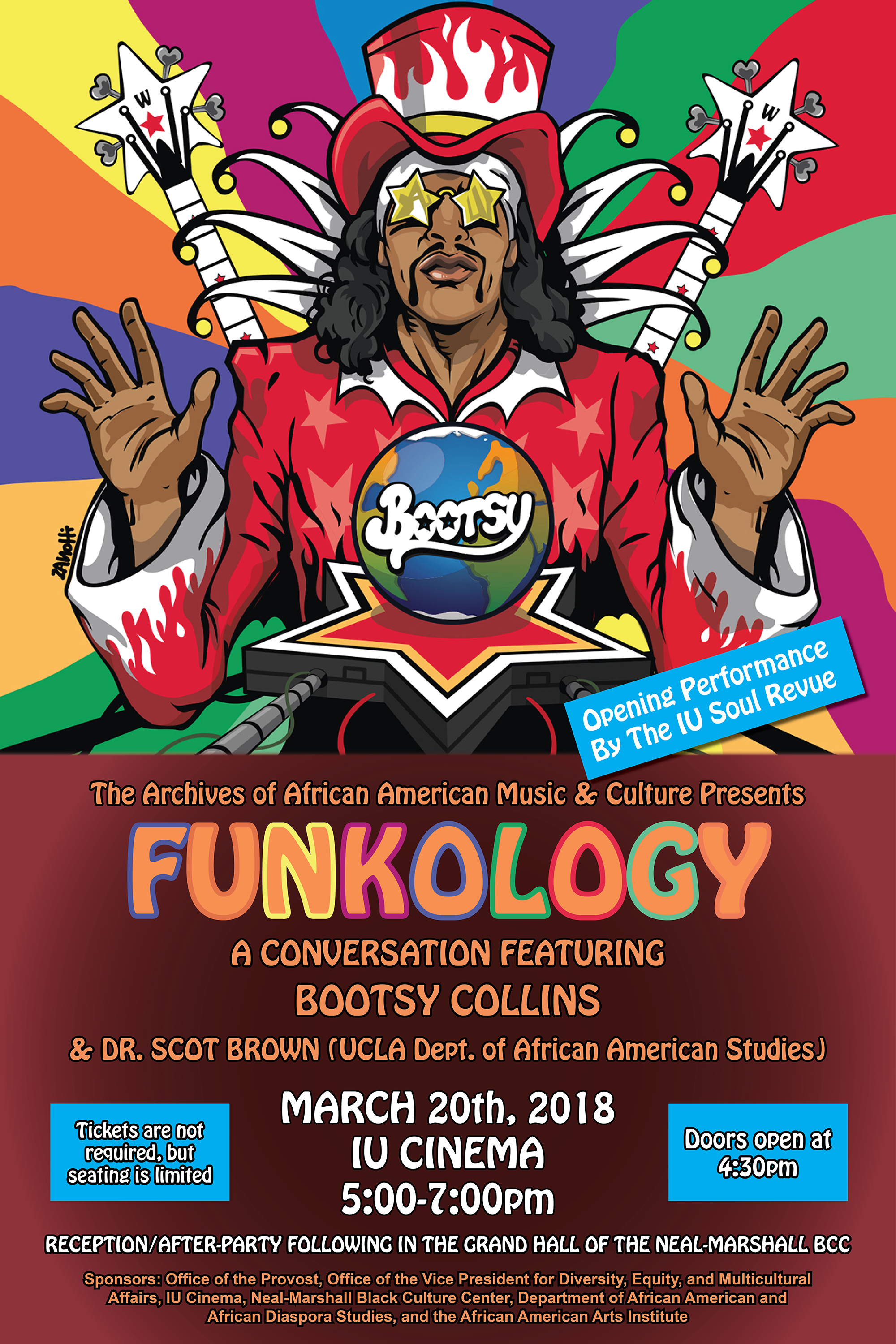
“Funkology” will open with a performance by the IU Soul Revue, directed by James Strong, who will set the tone by performing hits associated with Collins’ own music catalogue as well as his affiliation with legendary funk architect James Brown and funk innovator George Clinton and Parliament-Funkadelic. Music scholar Dr. Scot Brown, a professor of History and African American Studies at UCLA, will offer a brief historical overview of funk music with particular focus on the contributions of Ohio musicians from the Dayton-Cincinnati region. Dr. Brown will then engage Collins in a wide-ranging conversation about his life-long dedication to “the One” (the definitive rhythmic accent on the first beat of the measure, the hump, groove, joint, governing pulse and attitude of the funk universe), along with his role as a primary force in the music genre for nearly 50 years.
The Conversation will be followed by a reception in the Grand Hall of the Neal-Marshall Black Culture Center. Collin’s son, Cincinnati-based musician and deejay Ouiwey (“ooo-wee”) Collins, will be serving as MC and spinning hits from the Bootzilla playlist. Bootsy will also be signing copies of his new album, World Wide Funk, which will be available for purchase at the reception.
A related “Funkology” exhibit will be on display in the Neal-Marshall’s Bridgwater Lounge, beginning March 5. Utilizing items from the collections of the Archives of African American Music and Culture, the exhibit will provide an exploration of funk music, with a particular focus on connections between Indianapolis, IN and Dayton, OH, including the influence of Bootsy Collins and his collaborations with many notable funk bands and musicians from the region."Bodies of Sound: Locating the Beautiful in African American Music" Themester 2016
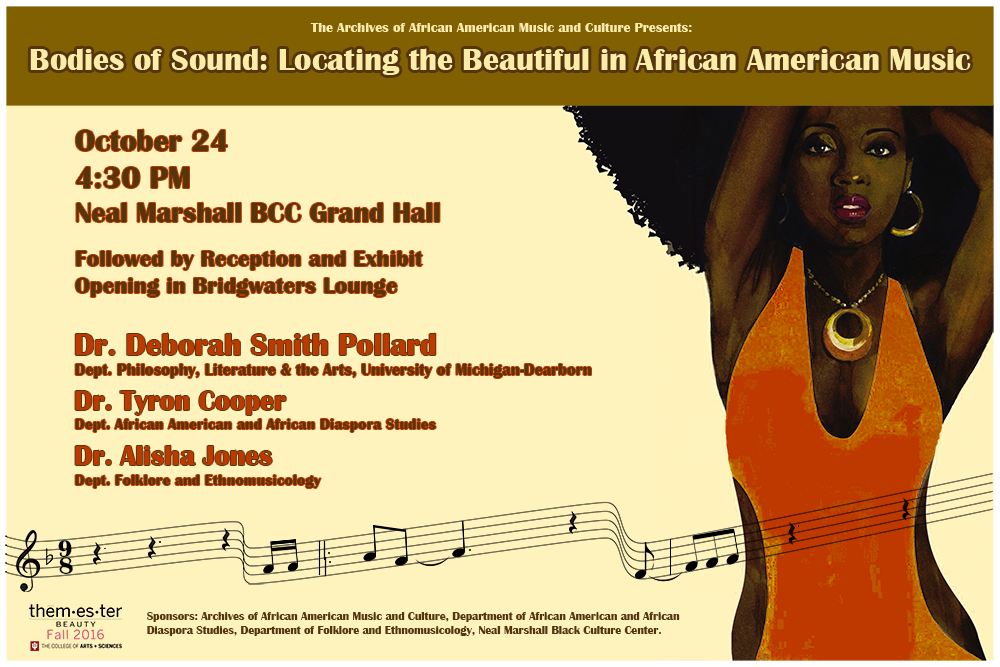
Hosted by the Archives of African American Music and Culture (AAAMC), this panel discussion will explore concepts of beauty in music from two distinct, though related perspectives. Representations of gendered body images, male and female, will serve as one area of focus, while the second topic will explore the body of aesthetic values which distinguish African American performance in ways which not only contrast, but often contradict those preferred by the larger American public. Panelists include guest speaker and distinguished scholar Dr. Deborah Smith Pollard (University of Michigan–Dearborn), Dr. Alisha Jones (IU Department of Folklore and Ethnomusicology), and Dr. Tyron Cooper (IU Department of African American and African Diaspora Studies).
Neal-Marshall Black Culture Center
Panel Discussion - October 24, 2016 from 4:30-5:30 pm (Grand Hall)
Exhibit Opening Reception - October 24, 2016 from 5:30-7:00 (Bridgwaters Lounge)
The event is accompanied by an exhibit installed in the Bridgwaters Lounge of the Neal Marshall Black Culture Center. This exhibit, curated by the Archives of African American Music and Culture, will explore the ways that musicians perform and represent concepts of African American beauty to make broader commentary on history, culture, politics, and social relationships. From the physical perspective, the exhibit will address controversies surrounding the predominant ideals of beauty that showcase and privilege skin color, hair textures, and body shapes that typically exclude the majority of performers of African descent. From the aesthetic perspective, the ways composers and artists have asserted their individual and collective agency in writing, recording, and performing songs that provide a culturally meaningful counter narrative to these views are highlighted. Examples abound across time, space, and musical genre ranging from jazz, soul, funk, and hip hop to gospel.
Accompanying Bodies of Sound music is available on a Spotify playlist and on a Youtube playlist.
"Hot Buttered Soul: The Role of Foodways and Music-making in Building and Sustaining African American Communities” Themester 2014
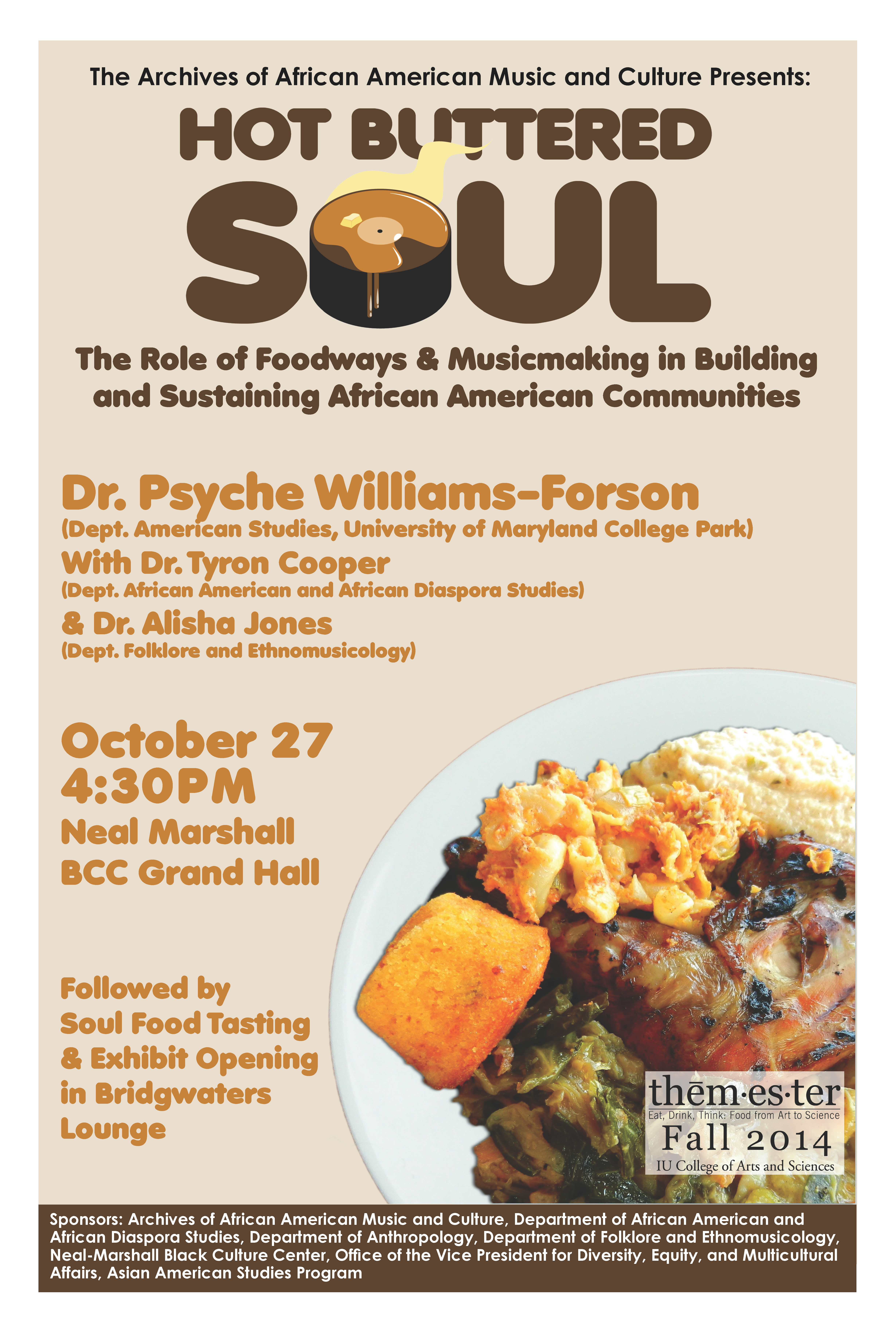
Extensions of the Tradition, Cook Music Library, Jacobs School of Music (Feb. 2014)
“Logan Westbrooks: Music Industry Executive, Entrepreneur, Teacher, Philanthropist,” Neal-Marshall Black Culture Center, IU (Feb. 2013)
“The Evolution of the Black Music Industry” Showers City Hall, Bloomington (Feb. 2013)
40th Anniversary of the IU Soul Revue, Neal-Marshall Black Culture Center, IU (2012)
“Why We Sing: Indianapolis Gospel Music in Church, Community and Industry.” Neal-Marshall Black Culture Center, IU (2011)
Fear of a Bleak Planet: Rapping about Race, Poverty, and the Environment (2010)
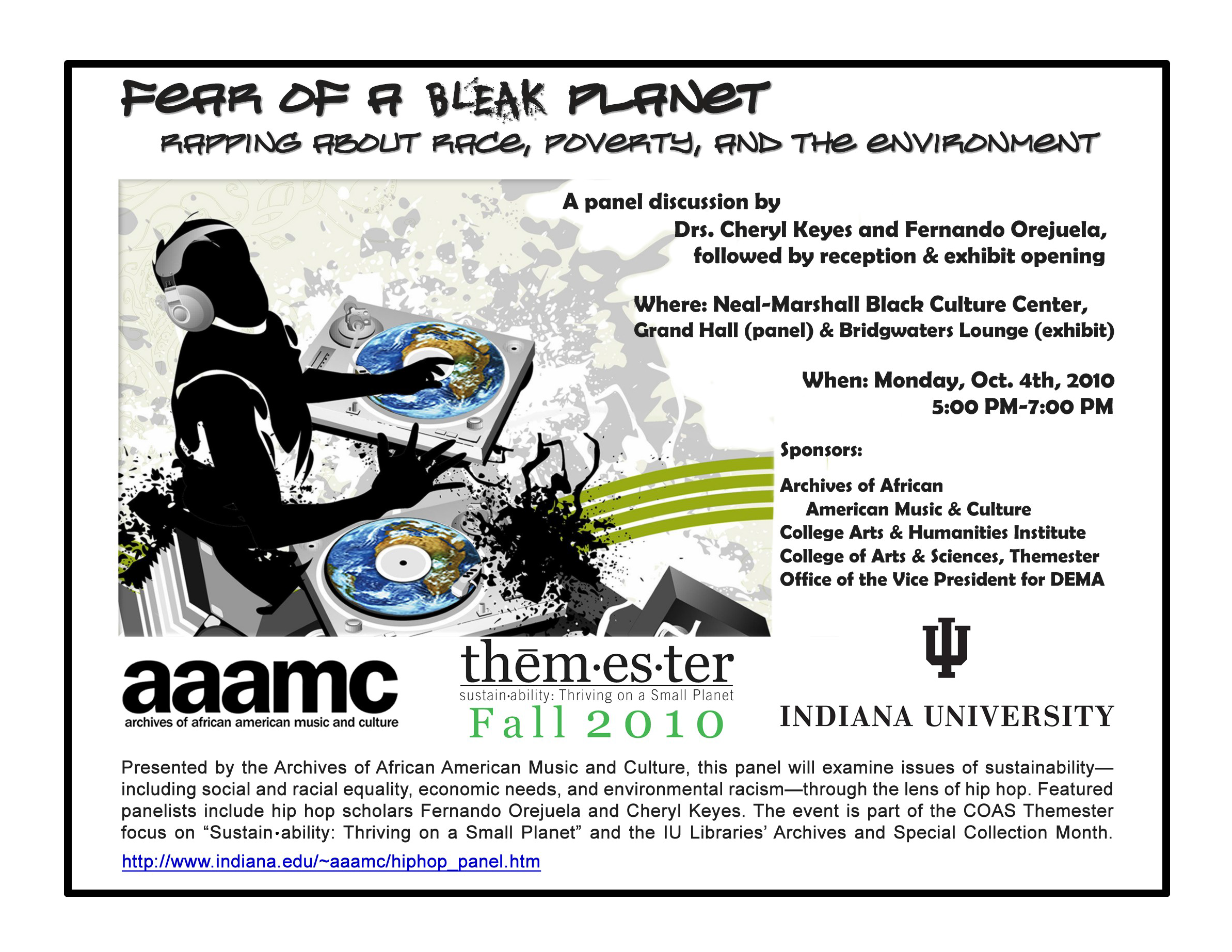
Hip hop is a complex cultural, social, and political movement that emerged during the post-civil rights era when the urban economy was on a steep decline, governmental support programs were being dismantled, drug abuse was on the rise, and violent crime rates reached alarming heights. Out of this increasingly desolate landscape, rap music arose as a voice of protest, offering commentary on the bleak environment and socio-political issues affecting inner-city communities. Over the past 30 years the movement has grown exponentially.
Presented by the Archives of African American Music and Culture, this exhibit and panel discussion examined issues of sustainability, including social and racial equality, economic needs, and environmental racism, through the lens of hip hop. Featured panelists included hip hop scholars Fernando Orejuela and Cheryl Keyes. The event was part of the COAS Themester 2010 focus on "sustain•ability: Thriving on a Small Planet" and Indiana University Libraries Archives and Special Collection Month.
For Additional Information, see issue no. 15 of Liner Notes, the AAAMC's annual newsletter.
Neal-Marshall Black Culture Center
Panel Discussion - October 4, 2010 from 5:00-7:00 pm (Grand Hall)
Exhibit Opening Reception - October 4-31, 2010 (Bridgwaters Lounge)
Departmental Sponsors
Archives of African American Music and Culture (AAAMC)
College of Arts and Science, Themester Program
College Arts & Humanities Institute
Office of the Vice President for Diversity, Equity, and Multicultural Affairs (DEMA)
Presenter Biographies
Dr. Fernando Orejuela is a Senior Lecturer in IU's Department of Folklore and Ethnomusicology and adjunct faculty in the Department of African American and African Diaspora Studies. He is currently completing edits on a textbook on hip hop culture to be published by Prentice Hall.
Dr. Cheryl Keyes, Professor of Ethnomusicology in the Department of Ethnomusicology at UCLA, is the author of Rap Music and Street Consciousness, which received a CHOICE award for outstanding academic books in 2004.
Reclaiming the Right to Rock: Black Experiences in Rock Music (2009)
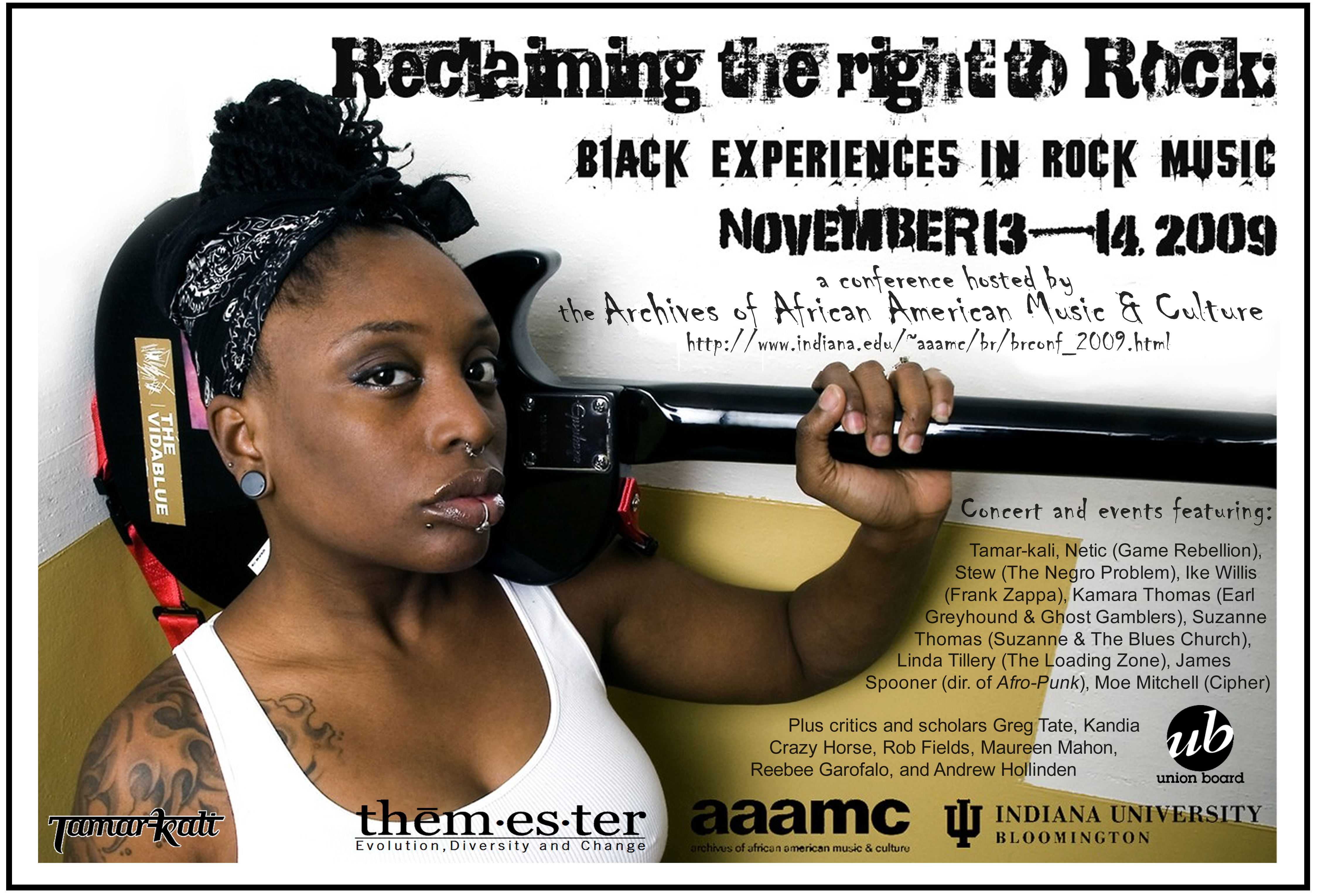
Reclaiming the Right to Rock: Black Experiences in Rock Music was a two-day academic conference featuring pioneering African American rock musicians with a series of panels devoted to exploring the history, definition, politics, and future of Black rock.
Additional information about this conference is included in the conference's special collection Reclaiming the Right to Rock collection finding aid.
Video and audio recordings made during the conference can be accessed on the IU Media Collections Online site.
Rock, Rhythm, & Soul: The Black Roots of Popular Music (2008)
Rock, Rhythm, & Soul: The Black Roots of Popular Music was a modular traveling exhibit produced by the Archives of African American Music (AAAMC) through the financial support of Indiana University’s Moveable Feast of the Arts, a Lilly Foundation funded program. The exhibit consisted of eight double-sided banners, each treating a theme or genre in African American Music. The banners presented viewers with stunning images, a text highlighting central issues and personalities, and a concise timeline of key historic events. A ninth banner provided an introductory text for the exhibit as a whole, backed with a description of the AAAMC and its mission.
The eight topical banners available to host institutions included:
- Soul
- Civil Rights Movement
- Black Radio
- Rhythm and Blues
- Black Rock
- Funk
- Gospel
- Hip Hop
Host institutions were able to tailor the exhibit by selecting as few or as many banners as they’d liked to suit both their areas of interest and their available exhibition space.
The exhibit was initially funded by the grant and covered under fair use provisions. Now that the grant period is over, the exhibit is on an indefinite hiatus while our staff investigates a sustainable model for leasing the banners to interested institutions.
Each of these double-sided banners is 39 in. (3.25 ft.) wide by 87 in. (7.25 ft.) high and comes with its own retractable banner stand. The banners are self-contained, free-standing, easy to ship, and can be set up and maintained with a minimum amount of effort.
Hosting institutions often embellished and personalized the exhibit by providing display cases with their own images, artifacts, and texts. The following photographs are of the Soul and Civil Rights Movement banners during their February 2008 debut at Indiana University’s Mathers Museum.
This exhibit was sponsored by Indiana University's Moveable Feast of the Arts program. Created through a generous gift from the Lilly Endowment Inc., the Moveable Feast of the Arts program was initiated by the IU Office of the President in 2004 with administrative and financial oversight provided by the Office of the Vice Provost for Research. The program’s mission is to showcase and extend IU's cultural resources to Hoosier communities and IU campuses across the state.
"Extensions of the Tradition"
"Extensions of the Tradition" is an annual concert and exhibition of original works by Black composers. The event is co-spsonsored with the African American Arts Institute.Roots of Techno: Black DJs and the Detroit Scene (2006)
One-day academic conference featuring pioneering techno DJs and showcasing the African American origins, development, and ongoing vitality of techno and house music in Detroit."Soul and Funk: the Naptown Sound" (2005)
"Soul and Funk: the Naptown Sound" was an exhibition AAAMC produced with the Indiana Historical Society in Indianapolis, Indiana.Luvenia George (2003)
Public and classroom lectures and workshop, "The Involvement of Ethnomusicologists and Humanities Scholars in Public Sector Institutions.""Camilla Williams in Concert" (2002)
Public concert featuring international opera star and Indiana University emerita professor of music Camilla Williams.Michael Lydon (2001)
Public lectures and performances by author, composer, and performer Michael Lydon.Rowena Stewart (2001)
Public lecture, "Music: an Interpretive Voice in the Extraordinary World of Museums."Donna Lawrence (2001)
Lecture for Ethnomusicology Public Sector class about her work as an exhibit designer and consultant.Jack Gibson (February 1999)
Public and classroom lectures on Black Radio.Johnny Otis and the Johnny Otis Show (October 1998)
Public lecture on Rhythm and Blues and a performance in conjunction with the Society for Ethnomusicology conference.Harry Allen, Media Assassin and Hip-Hop Activist (November 1998)
Public and classroom lectures on Hip-hop music and culture."Let the Good Times Roll" Documentary
NPR documentary on Rhythm & Blues, produced with the Rhythm & Blues Foundation."Something in the Water: The Sweet Taste of Dayton Street Funk" (1998)
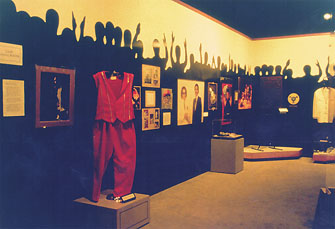
"Something in the Water: The Sweet Taste of Dayton Street Funk" was an exhibition AAAMC produced with the National Afro-American Museum and Cultural Center in Wilberforce, Ohio.
"Record Row: The Cradle of Rhythm & Blues" Documentary (1996)
PBS documentary with WTTW-TV Chicago."Black Radio: Telling it Like It Was" Documentary (1996)
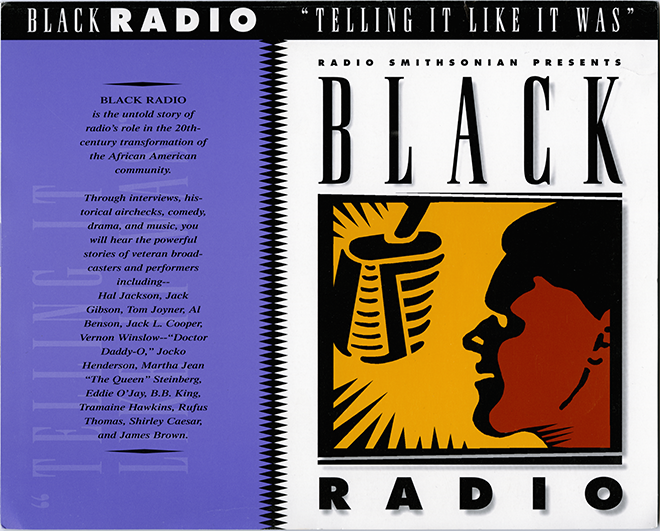
"Black Radio: Telling It Like It Was" was a collaborative project between the AAAMC and Smithsonian Radio. More information about the project is held in the project's special collection, and included in the "Black Radio: Telling It Like It Was" collection finding aid.
Please contact the AAAMC to request access to audio recordings of the entire radio program.

